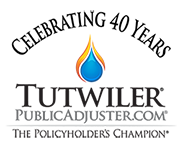This question was asked of us the other day and since it is rarely encountered in the everyday world of property insurance adjusting, I wanted to share it given our experience with “the option to repair tactic” that we’ve seen used by the insurance carriers.
First, a little background on this controversial clause found in most property insurance policies. This is rarely used by the insurance industry as it is considered a strong arm or adverse step if an amicable adjustment fails to resolve scope and price issues. By exercising their option to repair, they are taking away their policyholder’s right to dispute the position of the insurance company on the scope and amount of the loss that is contrary to what the policyholder feels is owed under the policy. In simple terms the insured, their contractor, consultants, public adjuster, attorney or any others who may be advocating for the policyholder are all out of the picture. The insurance company will hire their own set of experts, make repairs and pay their own hired guns. Under this scenario, no money will be paid to the policyholder for their loss and one must assume the insurance industry feels they are fulfilling their obligations under the policy.
But wait; there is a bigger picture to this process. Once the option to repair step is undertaken, the insurance company and its contractors become the guarantor of the repair of the property as well as the warrantor of the work. This can result in a very long financial liability tail and keep them (the insurance company) on the hook for continual payouts for a very long time. The other related issue has to do with accepting liability for all the law and ordinance construction upgrades that may be required by the building department. Most property insurance policies do not have coverage for code upgrades unless this coverage is purchased separately. So by exercising their option to repair, they now must conform to all the local building department requirements in order to get a C.O. (certificate of occupancy). So as you can imagine, this can become a very costly process that may result in much more money paid on a claim than otherwise would have been paid to the policyholder in a normal claim adjustment process.
But remember, the insurance industry is aware of all the pitfalls in this process and the last thing they want to do is enter into this malaise. While rare, they do tend to use this as a threat to strong-arm policyholders into complying with their view of the loss. The letters sent contain the clear message that if you do not take what we offer, we will give our money to our chosen contractors, not you. But remember even if an option to repair is made, you still have the ability to demand that they provide you with the scope of work they are proposing to do. And it is here where the policyholder can assert their rights. If the scope of work does not include putting back things you had before the loss, including quality of materials and complying with code, you may well have a right for legal action, not to mention having the folks at the building department intervene and come down hard on the insurance company’s contractor. Of course, you should always consult with a good property insurance attorney to review the facts of your claim. From our experience, the option to repair is an intimidation tactic to make the policyholder come around to the insurance company’s position. If contested, their first step may be to offer you the price of their scope of the loss and not a penny more. In other words, this is the amount we were going to pay our contractor but we will give it you. You can probably expect to see “full and final release” language attached to this type of offer so beware!
What can you do to avoid the option to repair which prevents you from getting paid the settlement money you thought you would get from your insurance company? The first step is always to read your policy. Look under the “LOSS PAYMENT” section as this is where you will most likely find the policy language. Pay particular attention to wording that says; “WE WILL GIVE NOTICE OF OUR INTENTIONS WITHIN 30 DAYS AFTER WE RECEIVE THE SWORN STATEMENT OF LOSS.” If you were savvy enough to send in a proof of loss and they were not savvy enough to give you notice within 30 days of its receipt, then they are out of luck in exercising their option to repair.
We have had a number of our clients over the years benefit from this little oversight on the part of their insurance company. So remember, the devil is always in the details, be proactive, read your policy or have a professional public adjuster or attorney who is on your side review it. Work with your advocates to put some protective measures in place like filing a proof of loss if you feel things are not going to go well. Finally, if you are stuck with the option to repair, all is not lost. It is still possible to get paid; it just requires a little sophistication from the experts on your team.
If you have questions regarding any property insurance related issues, please call 800.321.4488 or contact us to submit a question to one of our public adjuster or insurance claim experts.
